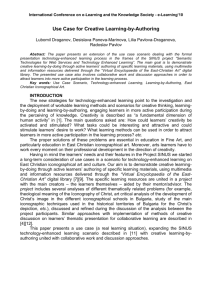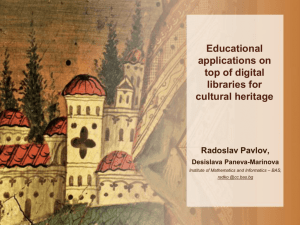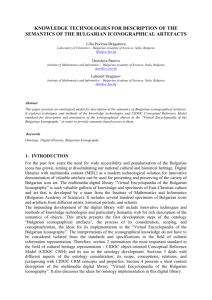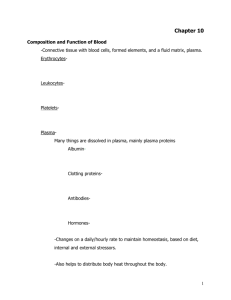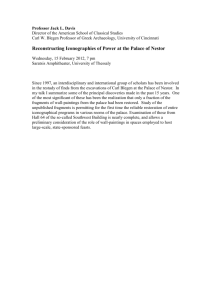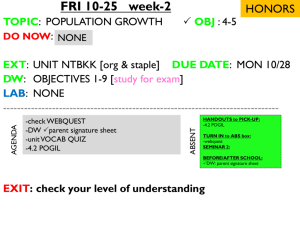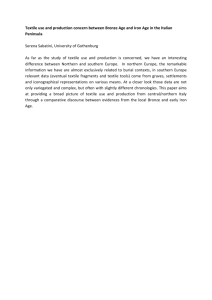ppt - Multimedia Digital Libraries
advertisement
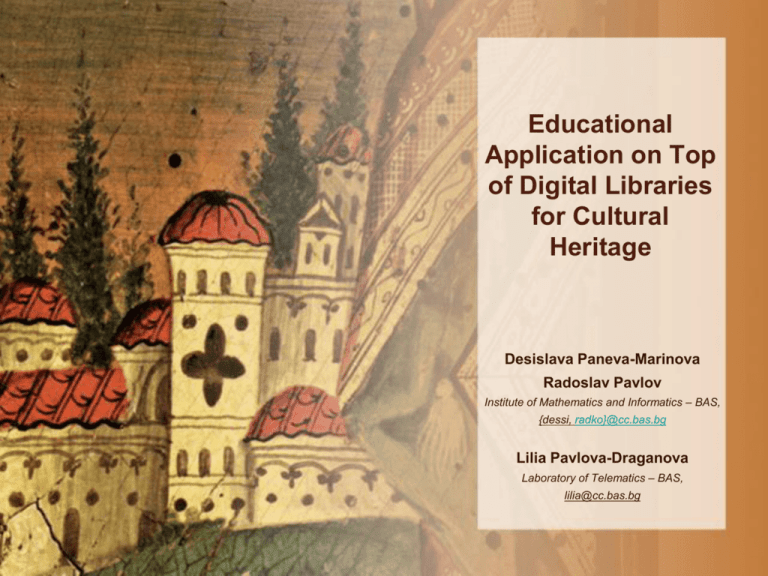
Educational
Application on Top
of Digital Libraries
for Cultural
Heritage
Desislava Paneva-Marinova
Radoslav Pavlov
Institute of Mathematics and Informatics – BAS,
{dessi, radko}@cc.bas.bg
Lilia Pavlova-Draganova
Laboratory of Telematics – BAS,
lilia@cc.bas.bg
Presentation overview
•
SINUS project
•
“Virtual encyclopedia of the Bulgarian
iconography” multimedia digital library – the
SUNUS learning objects source
•
Iconographical Art Semantics – Ontology
Preview
•
SINUS use case e-learning scenario
•
A real situation (use case) demonstrating the
SINUS scenario and the Iconographical Art
Ontology usage
SINUS project (1)
• Research Project “Semantic Technologies for Web
Services and Technology Enhanced Learning” (No.
D-002-189)
• Financial support: National Science Fund of Bulgaria
• Partners:
– 2 BAS institutes: Institute of Mathematics and Informatics and
Institute of Information and Communication Technologies
– 1 software company: Active Solutions Ltd.
• Duration: 3 years (2009 - June 2012)
SINUS project (2)
Objectives:
•
To develop an environment for extending, binding and using
heterogeneous multimedia digital libraries, accessible as web
services. Extensions of the DL in the following directions:
a/ Enrichment of the built-in domain knowledge, through
/additional/ ontological models and extended search
functionality;
b/ Enrichment of search results visualization – explicitly
controlled and content-based sorting of found objects, explicitly
controlled and content-based display of additional descriptive
(metadata based) information.
•
Development of specialized e-learning facilities, allowing
learning-by-authoring of specific learning materials by intensive
use of multimedia digital libraries.
“Virtual encyclopedia of the
Bulgarian Iconography” MDL
• Information content and digital objects with a detail semantic
description synchronized with CIDOC Conceptual Reference
Model standards
• Functionality
− Content creation: add (annotate and semantic indexing), store, edit,
preview, delete, group, and manage multimedia digital objects
(images, text, sound, video) and collections;
− Manage metadata (ontological and technical);
− Innovative tools and techniques for navigation, preview, access, and
browse of digital objects, collections and their descriptions;
− Simple and extended keyword search, complex semantic and
context-based search, selection and group of objects;
− Multilinguality (English and Bulgarian);
− Protection and preservation of the digital content (Watermarking,
CopyRights);
− Administration and data tracking services; analysis services;
− Data export;
− Personalized and adaptive access to the digital content.
http://bidl.cc.bas.bg
Object preview
http://bidl.cc.bas.bg
BIDL Functionality
Iconographical Art Semantics
• Domain ontology for the East-Christian iconographical art
with three “thematic entities” (also called levels of knowledge):
–
“Identification” entity consists of general data identifying aspects of the
iconographical object (IO) such as IO title, type, author, author’s clan and
biography, iconographic school, period, dimensions, current location and
source, and IO object identification notes (for example, distinctive
features, possession, inventory number, author’s signature, donor
inscriptions, etc.), and iconographic school description.
–
“Description” entity covers information concerning the descriptive details
of the theme and forms of representation, providing a better
understanding of the content. The main concepts included are: depicted
character/s, iconographical scenes, character/s in the scene/s, symbol/s
in the scene/s, characters’ gestures, characters’ vestment, detailed
description of the depicted content, etc.
–
“Technology” entity entity includes technical information revealing
iconographic techniques, base materials, gildings, repousse covers, etc.,
used in the creation of the iconographical object/collection, and also
concerning examinations of the condition, such as diagnosis or history of
the conservation treatment
“Identification” entity
Identification entity of the Ontology of the East-Christian iconographical art
-worksDuring
0..1
Place
-isLocatedIn
-country
-area
-town
-village
-monastery
-church
-chapel
-gallery
-museum
Dimension
-height
-width
-thickness
-unit
Period
1
-existsDuring
-year
-century
-part of a century
Location
1
0..1
-hasPeriod
-hasDimension
0..1
-hasIdentificationNotes
1
0..1
-isCreatedIn
0..1
Iconographical Object
Source
-country
-area
-town
-village
-monastery
-church
-chapel
-museum
-title
-type
1
1
1
-hasSource
*
0..1
*-isAuthorOf
-hasIconographicSchool
1
Iconographic School
1
1..*
-composeIO_at
1
-madeBy
0..*
1
-belongTo
-isRepresentativeOf
Author
-name
-type
-craft
-hasISDescription
0..1
0..1
-hasRepresentative
Description
-type
*
*
1
*
-isClanOf
-hasClan
Clan
0..1
IS Description
1
-name
1..*
IO Identification Notes
1
-containClan
-name
1..*
-hasBiography
0..1
Biography
“Description” entity
Description entity of the Ontology of the East-Christian iconographical art
1
1..*
Vestment
0..1
-depictsComposition
-name
-type
-element
Iconographical object
-isPresent_at
Composition
-type
-title
-type
1..*
1
*
-wears
1..*
-depicts
-isPresent_at
0..1
1..*
-hasDescription
1..*
1
-depicts
Description
Iconographical Character
0..*
-name
-cannonical type
Composition Description
-type
1..*
0..*
Iconographical Scene
-name
-depicts
1
1..*
-isDedicated_to
1
1
0..1
0..1
-hasISDescription
CC Description
Vestment Description
Icon.Scene Description
0..*
-makes
0..1
-hasDesription
Gesture
-hasVDescription
-hasCCDescription
Life of a Saint
-name
0..1
Church Celebration
1..*
Icon.Symbol Description
1
-name
-type
0..1
-contains
Icon. Symbol
-name
-type
0..*
1
-hasISDescription
“Technology” entity
Technology entity of the Ontology of the East-Christian iconographical art
Varnish
-type
-thickness
-equability
-state
Ground
-isComponentOf
Base
-type
-thickness
-equability
-state
-carving
-hasGround
-base material
-canvas
-hardness
1
0..*
1
1
0..1
1
-isMadeBy
1..*
1
Iconographic Technique
1
0..1
0..1
Iconographical Object
1
-hasGuilding
Guilding
-type
-base
-glue
-carving
-position
*
1
-hasRepousseCover
1
Description
Repousse Cover
-type
-material
-position
-state
-carving
0..1
-hasCurrentState
-type
Current State
-type
-hasDesription
1
-hasDescription
0..1
-hasDescription
Base Description
-title
-type
-name
-type
0..1
-hasBaseMaterial
-hasVarnish
0..1
Technique Description
State Description
SINUS e-learning scenario (1)
Scenario characteristics:
• Learning goals:
− improving and mastering domain knowledge;
− development and application of learners’ analytical skills;
− mastering professional DL usage.
• Learning tasks: development of educational projects for
assigned analyses of given characteristics of the objects
under study by:
− Constructing multimedia collection of DL objects to be analyzed;
− Comparison of objects characteristics;
− Development of the project as a multimedia document (text +
collection of objects).
SINUS e-learning scenario (2)
Scenario characteristics
–
Used methodology: project development using the
theoretical and experimental methods such as
analysis, comparison and differentiation, and
interactive methods - group work, discussion and
debate.
–
Basic resources: primary annotated digital
resources, semantically annotated digital resources,
learning resource, semantic resources (ontologies),
profiles of users.
–
Users: the developers of various resources and the
consumers of those learning resources.
SINUS use case (1)
• Use case title: Development of the project - The
Iconography of Christ in the Historical Territories of
Bulgaria
• Learning domain: East-Christian culture and art.
• Primary source of digital objects for the learning domain:
“Virtual Encyclopaedia of the Bulgarian Iconography”
multimedia digital library
• Users: developers of learning resources and consumers
of those learning resources (students and lecturers)
• General scenario situation
SINUS use case (2)
• Tasks:
– to make an analysis of the theological meaning of the iconography
of Christ (the Theology team);
– to make an art critical analysis of the chronological development of
the iconography of Christ in the different iconographical schools in
Bulgaria (the Art Critics team);
– to examine the main iconographic techniques used in the best
Bulgarian examples of iconography of Christ (the Art Technique
team);
– to make an icon of Christ or a part of a mural painting depicting one
of the Christ’s feasts (the Artistic team).
SINUS use case (3)
• Arts Critics team task: Make an art critical analysis of the
development in time of the iconographic image of Jesus
Christ in the various iconographical schools on Bulgarian
land. Steps to be performed:
–
Select a minimum of 6 iconographic object containing the image of Jesus
Christ in a one-figure composition.
–
Arrange the iconographic objects in groups by school of iconography.
–
If a school of iconography’s group contains objects by an eminent author and
founder of the school, place these high on the list. Among the objects
designated for art critical analysis there should be at least one by a prominent
author/school founder, if available.
–
Ensure that the iconographic objects designated for art critical analysis are
currently in good condition.
–
Ensure that at least one primitive iconographic object and at least one
Renaissance iconographic object are included in the iconographic objects
designated for art critical analysis.
SINUS use case (4)
• Art Technique team task: Find iconographic objects
containing the image of Jesus Christ in order to compare
their specifics from a technological point of view
–
Find all the iconographic scenes with Jesus Christ.
–
Choose one iconographic scene with a Christ’s feasts ((Holy Cross, Nativity,
Epiphany, Palm Sunday, Ascension, Pentecost and Transfiguration), with the
most samples (iconographic objects), minimum 6.
–
Ensure the selected iconographic objects are on solid base (wood, stone and
metal, bone, glass).
–
Ensure only iconographic techniques (tempera, oil, mixed) are used in the
painting of the iconographic objects.
–
Ensure the iconographic objects contain gilding.
–
Ensure the Iconographic objects are arranged by temporal characteristics, for
example, century.
The Iconography Ontology Learning Application
In the sample task for the Arts critics’ team the main learning objective of the
user is to make concrete analysis in the iconography domain. The subtasks (1-6)
show steps (sub-goals) to be executed in this analysis. These steps could be
presented as a formula combining one of the “Bloom Taxonomy” verbs with a
term (concept) from the ontology of the East-Christian iconographical art. In
the SINUS learning platform the Student will “execute” the Bloom’s verb action on
the concept(s) from the ontology of the East-Christian iconographical art. I
In step 1 the Student collects iconographical objects presenting Iconographical
character = Jesus Christ in a composition type = one-figure.
In step 2 the Student classifies (i.e. arranges the iconographical objects in groups)
iconographical objects by a certain iconographic school.
In step 3 the Student has to discover-select-show iconographical objects by a
certain author type, etc. …
THANK YOU
FOR YOUR ATTENTION!
http://bidl.cc.bas.bg
http://sinus.iinf.bas.bg
